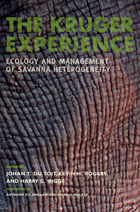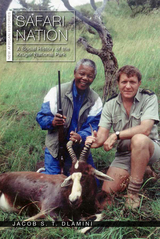
Kruger National Park in South Africa has one of the most extensive sets of records of any protected area in the world, and throughout its history has supported connections between science and management. In recognition of that long-standing tradition comes The Kruger Experience, the first book to synthesize/summarize a century of ecological research and management in two million hectares of African savanna.
The Kruger Experience places the scientific and management experience in Kruger within the framework of modern ecological theory and its practical applications. The book uses a cross-cutting theme of ecological heterogeneity -- the idea that ecological systems function across a full hierarchy of physical and biological components, processes, and scales, in a dynamic space-time mosaic. Contributors, who include many esteemed ecologists who have worked in Kruger in recent years, examine a range of topics covering broad taxonomic groupings and ecological processes. The book's four sections explore:
- the historical context of research and management in Kruger, the theme of heterogeneity, and the current philosophy in Kruger for linking science with management
- the template of natural components and processes, as influenced by management, that determine the present state of the Kruger ecosystem
- how species interact within the ecosystem to generate further heterogeneity across space and time
- humans as key components of savanna ecosystems
In addition to the editors, contributors include William J. Bond, Jane Lubchenco, David Mabunda, Michael G.L. ("Gus") Mills, Robert J. Naiman, Norman Owen-Smith, Steward T.A. Pickett, Stuart L. Pimm, and Rober J. Scholes.
The book is an invaluable new resource for scientists and managers involved with large, conserved ecosystems as well as for conservation practitioners and others with interests in adaptive management, the societal context of conservation, links between research and management in parks, and parks/academic partnerships.

Safari Nation opens new lines of inquiry in the study of national parks in Africa and the rest of the world. The Kruger National Park is South Africa’s most iconic nature reserve, renowned for its rich flora and fauna. According to author Jacob Dlamini, there is another side to the park, a social history neglected by scholars and popular writers alike in which blacks (meaning Africans, Coloureds, and Indians) occupy center stage. Safari Nation details the ways in which black people devoted energies to conservation and to the park over the course of the twentieth century—engagement that transcends the stock (black) figure of the laborer and the poacher.
By exploring the complex and dynamic ways in which blacks of varying class, racial, religious, and social backgrounds related to the Kruger National Park, and with the help of previously unseen archival photographs, Dlamini’s narrative also sheds new light on how and why Africa’s national parks—often derided by scholars as colonial impositions—survived the end of white rule on the continent. Relying on oral histories, photographs, and archival research, Safari Nation engages both with African historiography and with ongoing debates about the “land question,” democracy, and citizenship in South Africa.
READERS
Browse our collection.
PUBLISHERS
See BiblioVault's publisher services.
STUDENT SERVICES
Files for college accessibility offices.
UChicago Accessibility Resources
home | accessibility | search | about | contact us
BiblioVault ® 2001 - 2024
The University of Chicago Press









